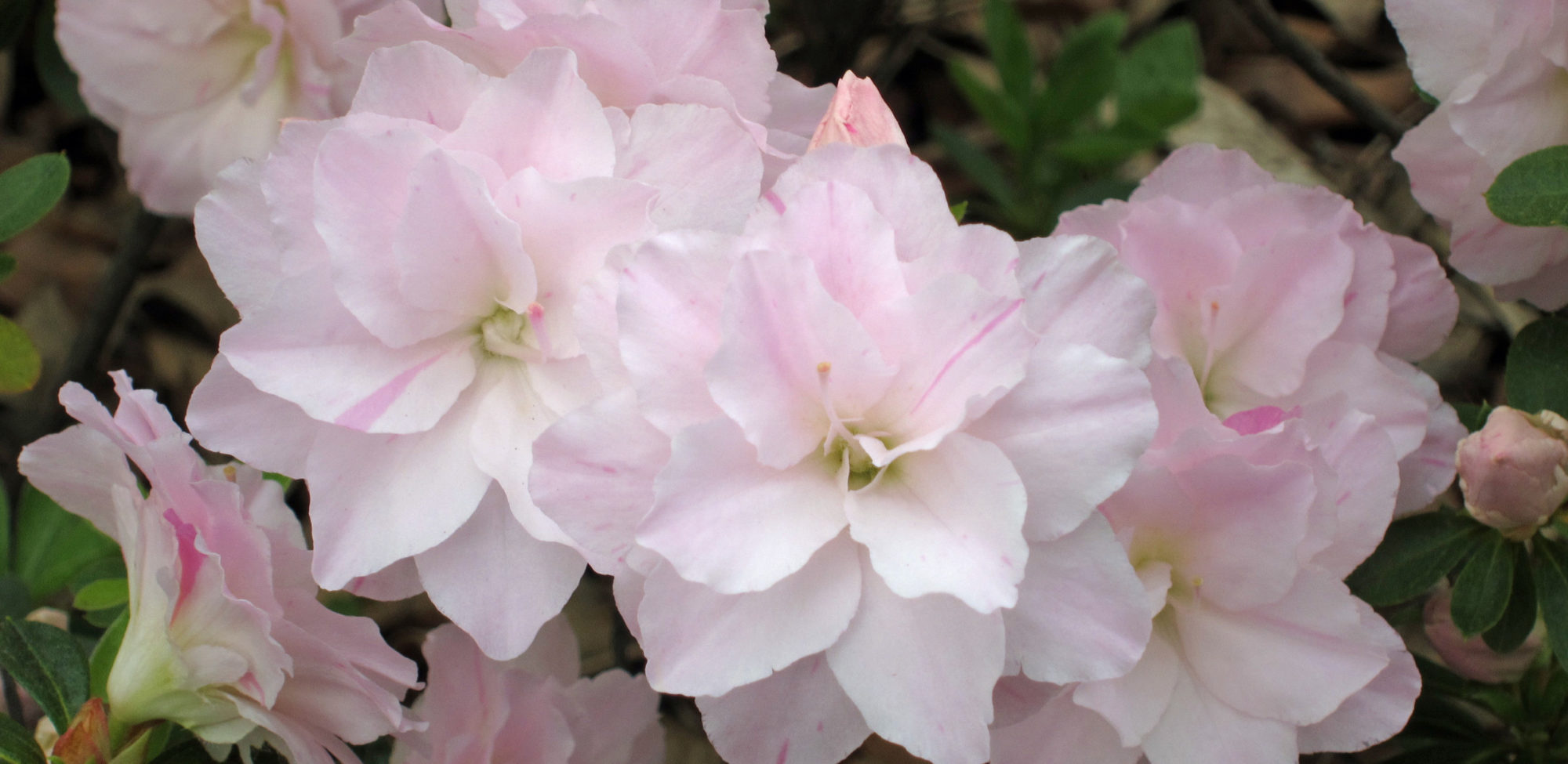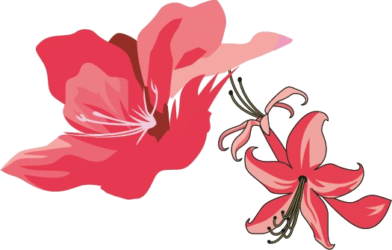History, Azaleas, and Sweet Tea
ASA 2019 Convention
Summerville, SC • March 14-16, 2019
Tom Johnson—Charleston, South Carolina
Wyndham Garden Hotel or Hampton Inn
Schedule
Registration Form
The Rev. John Drayton Azalea Chapter of the Azalea Society of America and Magnolia Plantation and Gardens will host the society’s 2019 convention Thursday to Saturday, March 14-16, 2019, in Summerville, South Carolina.
 Magnolia Plantation Home surrounded by azaleas Photo © Magnolia Plantation |
Themed “History, Azaleas, and Sweet Tea,” the conference is appropriately being held in Summerville, which is certified as an ASA Azalea City and known as the home of “sweet tea.”
Convention speakers will include Dr. John Nelson, chief curator at the A.C. Moore Herbarium, Department of Biological Sciences at the University of South Carolina; Sidney Frazier, Middleton Place’s vice-president of horticulture; native azalea expert Ernest Koone; and historic interpreters Dontavius Williams and Kirk Brown.
Planners selected Summerville as the convention site because of the town’s unique history. The first settlement in Summerville began following the Revolutionary War. In 1785, it was referred to as the Pineland Village. Plantation owners flocked to Summerville to escape insects and swamp fever. By 1847, Summerville was incorporated. In that year, the town passed a law against cutting down large trees. Today, the motto on the town’s official seal reads: “Sacra Pinus Esto (The Pine is Sacred).”
In this historic town, the Wyndham Garden Hotel and the Hampton Inn, located across the street from one another, have been selected as sites for this year’s convention. Room rates, not including taxes, are $129 at the Wyndham and $139 at the Hampton. Rooms are limited so book early.
Thursday, March 14 Welcome and Plant Sale
Check-in on Thursday will be in the Wyndham Hotel’s lobby where you will receive a convention bag filled with goodies, agendas, and badges. Since Wyndham’s banquet hall can seat 150 people, most activities will be held there. The azalea and plant sale will be held across the street at the Hampton.
The fun starts Thursday night at the welcome reception where you can visit with old friends, make new ones, and receive information on the upcoming tours and educational programs. The plant sale will be open for a limited time (5 p.m.- 9 p.m.), so arrive early to get those rare azaleas and other plants before they go home with someone else.
Friday, March 15 Tours and Speakers
Friday’s breakfast, catered by Beyond Expectations, will include Belgian waffles with assorted toppings, pecan-smoked bacon, fresh seasonal fruit, stone-ground cheddar-cheese grits, biscuits, coffee, and juices. Buses will load at 8:00 a.m., so breakfast early.
Buses load at 8:00 a.m. Friday for the tours. The adventure starts at Middleton Place, home of America’s oldest formal gardens.
 Formal Garden Camellia Walk at Middleton Place Photo © William C. Miller III |
After touring Middleton, lunch will be served there. Sidney Frazier, Middleton’s vice-president of horticulture, will talk about the gardens.
Mepkin Abbey, a former plantation with its beautiful gardens, is the next stop. Mepkin Abbey is now an active Roman Catholic monastery. The order was established in 1949. The monks live by the work of their hands, supporting the poor and devoting their lives to unceasing prayer, spiritual study, work, and hospitality. The grounds include the Nancy Bryan Luce Gardens, as well as a gift shop with dried mushrooms and garden compost from the Abbey’s farm; and candies, preserves, and creamed honey from other Trappist abbeys.
Following the abbey, we will return to the hotels for dinner on your own. Don’t stray too far or you will miss learning little known facts about Charleston’s intriguing history. The evening will start with Kirk Brown’s portrayal of Fredrick Law Olmstead, the father of American landscape architecture. In 1853, Olmstead traveled through the south and Charleston and then he wrote about rice production. In 1906, the Olmstead Brothers’ firm designed Charleston’s Hampton Park.
The history lesson will continue with the story of a slave boy named Adam. Dontavius Williams will present “The Chronicles of Adam” in a riveting interpretation. Although based on a real person, this story is comprised of various accounts, historical facts, and life lessons for people of any age.
Saturday, March 16 Tours, Banquet, Annual Meeting
Rise early on Saturday for another Beyond Expectations breakfast of farmhouse frittatta (similar to an omelette or quiche) with bacon and sausages, fresh seasonal fruit, stone-ground cheddar-cheese grits, biscuits, coffee and juices.
Buses load at 8:00 a.m. Saturday for the Charleston Tea Plantation on Wadmalaw Island. William Barclay Hall started the tea plantation with Camellia sinensis plants originally grown by Dr. Charles Shepard at his Pinehurst Tea Plantation in Summerville. After his death in 1915 that plantation closed, and Dr. Shepard’s plants grew wild for 40 years. In 1963 a 127-acre potato farm on Wadmalaw Island, used as an experimental farm, included transplants of Shepard’s plants from Pinehurst. In 1987, Hall, a third-generation tea taster with formal training during a four-year tea apprenticeship in London, England, purchased the land and converted the research farm to a commercial tea producing operation. Tea plantation guides will discuss how plants are grown and harvested.
Lunch will be served at Magnolia Plantation, America’s oldest romantic-style garden. During lunch, Ernest Koone will discuss the history of native azaleas. After lunch roam Magnolia’s gardens on your own or join an organized tour led by a member of Magnolia’s garden staff.
 Wealth of azaleas at Magnolia Plantation, including many Southern Indians, deciduous azaleas, and newer varieties as well. Photo © William C. Miller III |
Return to the hotel for the farewell banquet. The menu includes Caesar salad, Charleston chicken, oven-roasted red bliss potatoes, haricot verts (green beans) or Southern-style green beans, rolls and butter.
Dr. John Nelson, chief curator at the A.C. Moore Herbarium, Department of Biological Sciences at the University of South Carolina, will be the banquet speaker. The herbarium in Columbia, SC, contains more than 130,000 dried plant specimens, primarily from the southeastern United States. Established more than 100 years ago, the herbarium contains a diverse collection of vascular and nonvascular plants.
The 2019 Annual ASA Meeting will follow the banquet.

